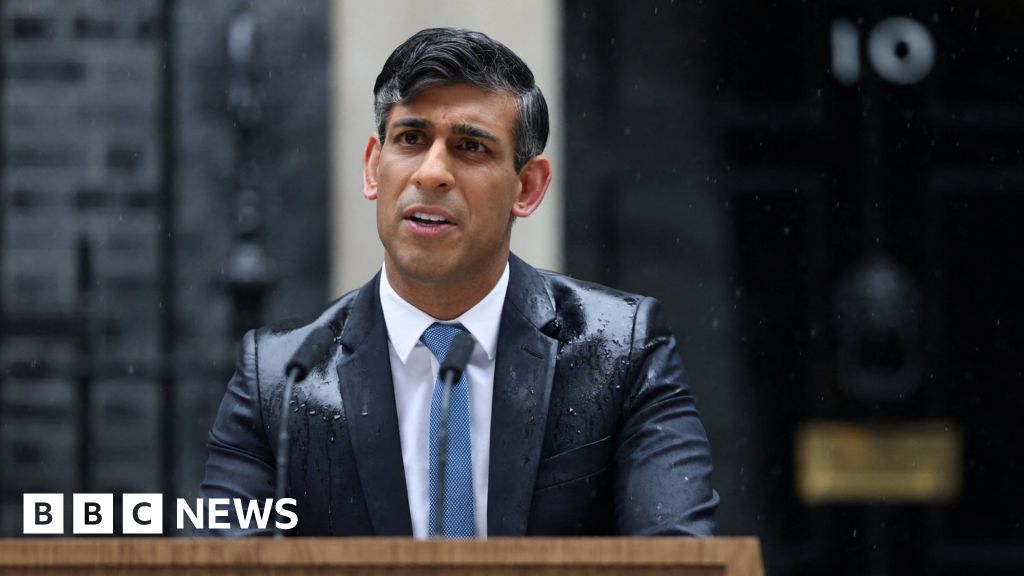World
Sunak announces UK general election for 4 July – BBC News

- By Paul Seddon
- Politics reporter, BBC News
Rishi Sunak has vowed to “fight for every vote” as he called an early UK general election for Thursday 4 July.
The PM made the announcement in a rain-soaked speech outside 10 Downing Street, as he bids to win a fifth term in office for the Conservatives.
The surprise move overturned expectations of an autumn poll, which might have given the Tories a better chance of closing the gap with Labour.
Sir Keir Starmer said it was “time for change” away from “Tory chaos”.
Labour has been posting large leads in national opinion polls, and has insisted it has a fully organised campaign ready to go.
Parliament will now be suspended on Friday, before it is formally shut down on Thursday next week ahead of an official five-week election campaign.
It means there are only two days to pass any outstanding legislation – a move which will mean some of the government’s measures will have to be abandoned.
October or November had previously been thought more likely for an election date.
And as Prime Minister’s Questions got under way in the Commons, it still was not clear whether an announcement was coming. It was not until just after 17:00 BST that the UK’s first July election since 1945 was confirmed.
The prime minister referred to the inflation figures as he announced the election date in Downing Street later in the day, in a sign he hopes to frame his campaign around a narrative of economic recovery after a period of rising living costs.
He added that the fall in inflation, along with the UK’s emergence from recession earlier this year, were “proof that the plan and priorities” he had set out were working.
But his statement did not go entirely to plan, as he battled worsening rain and activists blasting out New Labour anthem Things Can Only Get Better over a loudspeaker.
There was confusion in at least some parts of the Conservative Party about why Mr Sunak had decided to call the election sooner than had been widely expected.
“I just don’t understand it,” one Tory MP told the BBC. “The economy is improving. Why not give that more time to bed in?”
One senior minister was annoyed that Mr Sunak had given his speech in the driving rain.
“If the whole point was to remind the public that he was Mr Furlough, why not do the speech inside from the same briefing room?”
They added: “Labour MPs are happy. We’re not. That tells a story.”
‘Britain deserves better’
In a TV statement shortly afterwards, Sir Keir argued Tory “chaos” had damaged the economy, and a vote for his party represented a chance to bring political stability.
Adding it was “time for change”, he criticised the Conservatives’ management of public services, the NHS and record on tackling crime.
“Give the Tories five more years and things will only get worse. Britain deserves better than that,” Sir Keir added.
SNP leader John Swinney, who took over as Scotland’s first minister earlier this month, said the election was a chance to “remove the Tory government and put Scotland first”.
Lib Dem leader Sir Ed Davey said it would be a chance to “kick Rishi Sunak’s appalling Conservative government out of office”, whilst Greens co-leader Carla Denyer said her party was aiming to elect at least four new MPs.
And Reform UK leader Richard Tice said the Tories had “broken Britain” but Labour would “bankrupt Britain”, and only his party would offer “common sense policies that can now save Britain”.
Mr Sunak’s statement is the start of weeks of general election campaigning for the 650 seats in Parliament.
It will be fought on the first set of new constituency boundaries since 2010, redrawn to reflect population changes since then, and will be the first where voters have to show ID.
The Royal Family has postponed engagements “which may appear to divert attention or distract from the election campaign”, Buckingham Palace said, adding that the King and Queen sent their “sincere apologies” to those affected.
Political volatility
At the last election in 2019, Boris Johnson won an 80-seat majority after calling a snap poll as he fought to get his Brexit withdrawal deal through Parliament.
It was followed by an extraordinarily volatile period in British politics, as the country was hit by the Covid pandemic and Mr Johnson was forced to resign, amid a cabinet revolt over a series of scandals.
His successor Liz Truss lasted 49 days in the job before she quit, after a market backlash to her tax and spending plans announced at a hastily arranged “mini Budget” in September 2022.
This is the first general election since 2015 that has not required a vote in Parliament to approve the date, since legislation fixing the time between polls was reversed two years ago.







:max_bytes(150000):strip_icc()/roundup-writereditor-loved-deals-tout-f5de51f85de145b2b1eb99cdb7b6cb84.jpg)


